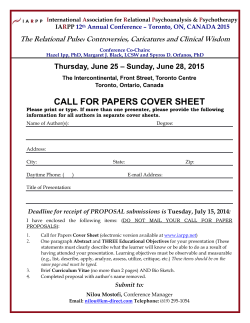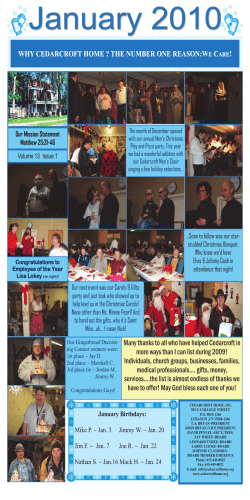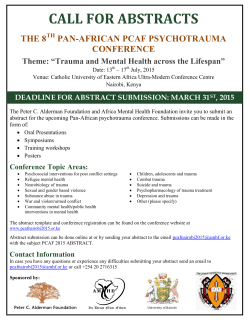
Dr. Allan Schore Events in Northern New England – May 2015
Dr. Allan Schore Events in Northern New England – May 2015 Saturday, May 16 “The Science of the Art of Psychotherapy” What: When: Where: Who: Cost: 6-hour Master Class 8:30am registration; 9am – 4:30pm Southern NH University (Hospitality Center), 2500 North River Rd., Manchester, NH 03106-1045 For therapists working with adults and adolescents. $150 registration by April 16 th ($160 thereafter) In this workshop Dr. Schore will discuss the essential themes of his recently published book, The Science of the Art of Psychotherapy (Norton). Using the biopsychosocial perspective of Regulation Theory, a model of the development, psychopathogenesis, and treatment of the implicit self, he will discuss a number of essential clinical phenomena that occur beneath the words of the patient and therapist. He will suggest that due to significant advances in neuroscience we are currently experiencing a paradigm shift in psychotherapy, from conscious cognition to unconscious affect. Referring to his current clinical, research, and theoretical studies in neuropsychoanalysis, traumatology, and developmental affective neuroscience, he will discuss the relational and neurobiological change mechanisms that lie at the core of psychotherapy, especially in heightened affective moments of treatment. Over the course of the day he will offer a number of PowerPoint – audience dialogues which suggest that changes in the connectivity of the “emotional” right brain is a fundamental outcome of effective treatment, and that the incorporation of current scientific studies of the right brain into updated clinical models allows for a deeper understanding of not only why but how psychotherapy works. For information and registration, contact Sue Morrill, NH-NASW at 603-226-7135 [email protected] 4 Chenell Dr., Ste.103 Concord NH 03301 Co-sponsored by NH Chapter of NASW, the NH Psychological Association, and the Vermont Society of Modern Psychoanalysis Dr. Allan Schore Events in Northern New England – May 2015 Monday, May 18 “Relational Trauma and the Development of the Right Brain” AM: Working in the right brain: A regulation model of clinical expertise for treatment of attachment trauma This lecture will offer an interpersonal neurobiological model of psychotherapeutic expertise for working with early-forming relational (attachment) trauma. The paradigm shift alters our conception of clinical expertise from one who offers insight-oriented interpretations in order make the unconscious conscious to one who optimally processes and regulates the patient’s unconsciously communicated bodily-based affective states in order to facilitate development of the unconscious mind itself. PM: Therapeutic enactments: working in right brain windows of affect tolerance The ongoing paradigm shift is deepening our understanding of the affective and neurobiological dynamics of clinical enactments. Very recent relational and neuropsychoanalytic models posit that enactments are eruptions of unconsciously strong overwhelming affect within the therapeutic relationship and not technical mistakes, and that they represent a way of reaching deeply into traumatized areas. The shift from cognition to emotion, from conscious to unconscious processes, and from left to right brain allows for a deeper understanding of how regulated enactments are a central mechanism of therapeutic action, especially for patients with a history of attachment trauma. What: When: Where: Who: 6-hour workshop 9:00 am to 4:30 pm Inn at Essex Essex Jct. VT Clinicians who work with young children and families, physicians, psychotherapists, child protection workers, early interventionists, post-adoption workers, educators, as well as family court judges and policy makers – who want to understand the neurological consequences of, and ways to intervene with, disrupted attachments. For more information & Registration, contact: [email protected] 802-658-0040 Sponsored by NFI Vermont Dr. Allan Schore Events in Northern New England – May 2015 Wednesday, May 20, 2015 # 1 – “The Developmental Origins of Health” Presentation at Pediatric Grand Rounds – Geisel School of Medicine – 8:oo-9:00 am Dartmouth-Hitchcock Medical Center, Lebanon, NH 03756 Schore will: *Present the neuroscience of how early relationship create the foundation for physical and mental health. *Illustrate the opportunities for assessing and supporting infant-parent relationships in pediatric settings. *Help pediatricians see not only obvious infant traumas, but also the subtle signs of troubled relationships that compromise physical and mental health. *Describe how parents’ emotional reactions to their child are rooted in the parents’ early developed and unconscious right-brain processes. *Show how pediatricians’ emotional reactions to both parents and child provide essential clinical information. No registration needed. For more information, contact Special Needs Support Center, Lebanon NH 603-448-6311 [email protected] and/or see www.ecmhn.org # 2 – “Where Do Children’s Minds Come From? The Relational Roots of Healthy Brains” What: Where: Who: Cost: 4-Hour Advanced Workshop 1:00-5:00pm Wilder Event Center, 2087 Hartford Ave., Wilder VT Childcare directors and staff, early interventionists, preschool special educators, home visitors, as well as mental health professionals, social workers, teachers $40 per person. Some scholarships are available. See below contacts. Allan Schore was the first neuropsychologist to relate brain development to the quality of babies’ attachment. His 1994 book, Affect Regulation and the Origin of the Self, changed the climate of scientific opinion about the nature of the mind. This workshop will inform participants as to how they can promote self-regulation in young children and strengthen these functions in troubled older children. The workshop will consist of two 75-minute lectures, each followed by discussion. Bring your questions to this leading expert in brain science. Talk with him about its surprising and hopeful implications. For more information, contact Special Needs Support Center, Lebanon NH 603-448-6311 [email protected] and/or www.ECMHN.org For Registration, contact Child Care Project, 17 ½ Lebanon St. Hanover NH 03755 603-646-3233 [email protected] www.Dartmouth.edu/~ccp -Continued- #3 – Public Lecture “Promoting Life-Long Health: The Relational Roots of Well-Being” Where: When: Who: Cost: Filene Auditorium, Moore Hall Dartmouth College, Hanover NH 7:30 – 9:00 pm The general public. Parents are especially invited No Cost - No Registration Necessary In this 45-minute presentation, Schore will describe how early relational experience establishes habits of mind, body, and behavior that set the path for life-long health or disease. Followed by a 45-minute discussion. For more information, contact Special Needs Support Center, Lebanon NH 603-448-6311 [email protected] and/or www.ECMHN.org Dr. Schore’s presentations on Wednesday, May 20 and Thursday, May 21 are sponsored by the Early Childhood Mental Health Network and by its fiscal agent, Special Needs Support Center. Funding is provided by the Geisel Medical School Dept. of Pediatrics, and grants from NH Endowment for Health, the Jack and Dorothy Byrne Foundation, the Dwinell Charitable Trust, and Let’s Grow Kids. Dr. Allan Schore Events in Northern New England – May 2015 Thursday, May 21 “Relational Trauma and the Development of the Right Brain” What: When: Where: Who: Cost: 6-hour workshop 9:00 am to 4:30 pm Jesse’s Restaurant, Rt. 120, Hanover NH Clinicians who work with young children and families, physicians, psychotherapists, child protection workers, early interventionists, post-adoption workers, educators, as well as family court judges and policy makers – who want to understand the neurological consequences of, and ways to intervene with, disrupted attachments. $100 For more information & Registration, contact Special Needs Support Center, Lebanon NH 603-448-6311 [email protected] and/or www.ECMHN.org Co-sponsored by Dartmouth Trauma Intervention Research Center (DTIIRC) Early Childhood Mental Health Center (ECMHN), Special Needs Support Center (SNSC)
© Copyright 2026










